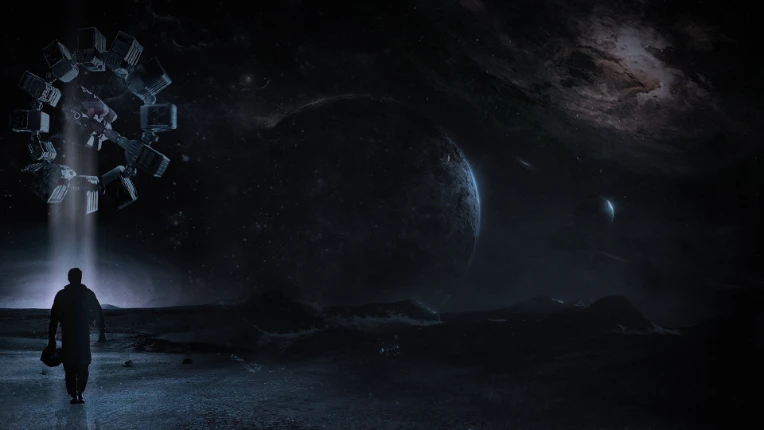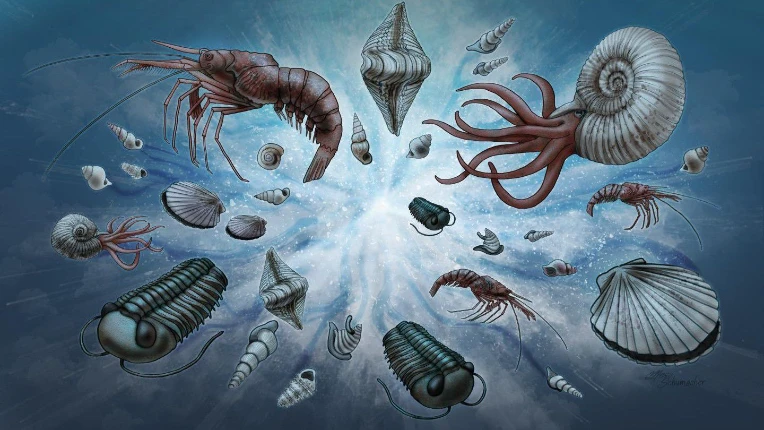The Island of Kerkenna, located off the coast of North Africa, is a flat, table-like landmass where only palm trees and cacti grow.
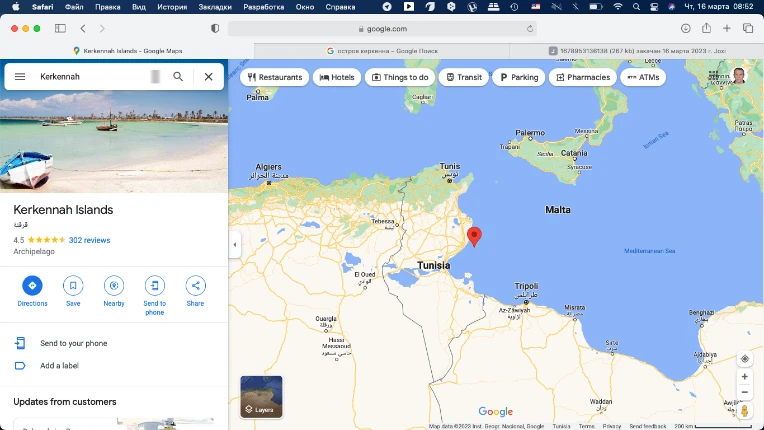
Kerkennah Islands (Google.Maps)
Due to the waterless, salty soil, rainwater serves as the only source of drinking water on the island. The island experiences 320 sunny days each year, which makes access to water extremely limited. While there are 45 days a year without sunshine, not all of these days necessarily bring significant rainfall.
The shores of the island were once pristine, with nary a scrap of algae in sight. The local camels, a symbol of prosperity, played a role in keeping the coastline clean by consuming all the seaweed that washed up on the shore. As the seaweed is salty, the camels find it quite palatable. The famed explorer Przewalski even noted that camels transferred from salty, dry environments to succulent grass would rapidly lose weight and perish – they simply cannot survive without salt. Interestingly, palm trees also possess a tolerance for the island’s salty soil, allowing them to thrive in such an inhospitable environment. In fact, due to the island’s salt marsh terrain, only palm trees, cacti, scorpions, and camels can be found there. It’s worth noting that the only valuable mineral resource available on the island is salt.
Today, tractors and cars have replaced the camels, and the algae on the shore is no longer eaten or cleared. The island is not a popular tourist destination, and this is not due to the excess salt but because of a mysterious feature of the island.
The island boasts a distinct characteristic: real criminals can successfully hide here. Law enforcers seem to turn a blind eye, allowing wanted individuals to live here without fear of being caught. This phenomenon appears to have existed for a long time. For example, in the third century BC, when the notorious bandit Hannibal was dealt a crushing defeat by the Romans, he fled to this island to recuperate and plan his next wave of robberies. Similarly, present-day fugitives wanted by Interpol also seek refuge here. Like Hannibal, they can hide here without being detected by law enforcement. The fact that this island remains a haven for such criminals is a mystery worth contemplating.
But When the Russian writer and his companions visited the island, the head of the Department of State Security contacted our host every other day to inquire about our activities. What an occasion for deep reflection about the mysteries of life!
In the adjoining studio, there lived a couple of lovers, an aging Swiss lady and a young Jordanian man. The owner told us that the State Security Service had no interest in this couple. So, in principle, one can determine the boundary beyond which they lose the ability to see. The Swiss woman, paid for the Jordanian’s services with money taken from her husband, was apparently in the same category as the homosexual Hannibal. Though she is certainly not as influential as he is. However, even she was suddenly overlooked by the authorities. There is always a boundary.
Perhaps the head of the island’s state security department was not entirely truthful when he explained the intense surveillance of us by claiming it was for our own benefit and that all tourists were under watch, without exception. After all, aren’t the aging Swiss woman and the young Jordanian in Tunisia also tourists? Why aren’t they receiving any attention?
On this salt island, we were lucky enough to meet a man who had been arrested by the state security officials multiple times, though his terms of imprisonment were counted in weeks rather than years. This man, now 68 years old, was a retired history professor from the University of Sfax and the founder and director of the island’s only local history museum. Surprisingly, the museum is quite large, and the professor has been building and expanding it for the past 25 years.
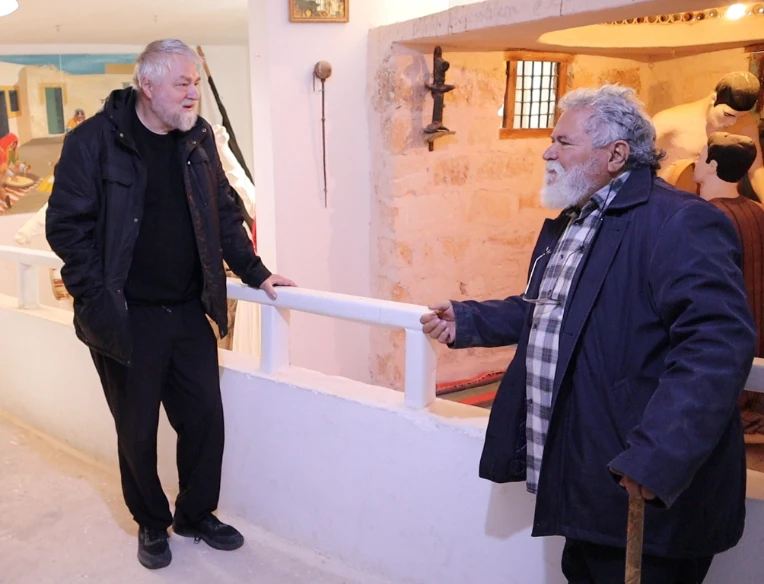
Writer Menyailov (left) and history professor Fehri (right)
What sets the professor apart? Aside from creating a museum, he lives in it. The second time I met him, he invited me to his home, where I saw a remarkable thing in his library or study – a bust of Heracles. At first glance, it may seem unremarkable since Heracles is a common subject. However, this was not the typical image of Heracles that we often see. The usual depiction is the “entrecôte” (a piece of meat) from the court sculptor during the time of the homosexual Alexander the Great. This is how all homosexuals would like to see Heracles – a mountain of muscle and nothing more. They wish to impose this perverted image on everyone, forgetting that Heracles exposed homosexuals, along with other perverts like centaurs and Amazons. As a result, they lost their mythical power over others and were no longer able to make people bend over backward for them. It is not surprising that all textbooks show Heracles only as an “entrecôte.”
However, a professor who has experienced imprisonment has a bust of Heracles that is quite different. The arms are not covered with unrealistically voluminous bumps of muscles. The arms of Venus de Milo are simply broken off. The sculptor has turned the Professor’s Heracles arms into strange and seemingly inappropriate stumps that are thin and short. The bust seems like an original execution, and in this genre, the lack of arms is justified. However, it is not canonical since the canonical ones have the arms cut off at the base. This Heracles has something thin and not muscular, emphasizing that Heracles is not a muscle-bound jock, as we are often led to believe, but a thinker, as it follows from the stories about him. In addition, the hero’s head is bowed in a specific way, like the statue of Nemesis, the goddess of justice, from the pirate city of Sagalassos in Turkey, indicating that Heracles is a man of conscience.
It’s all about conscience. It’s not surprising that Heracles was hated by the homosexual Alexander the Great, who decided to denigrate him. So the Macedonian-sponsored sculptor created an “entrecôte” without intellect or conscience.
Let us reiterate: the Professor’s portrayal of Heracles is atypical. I have never encountered such a sculpture anywhere, not even in illustrations. The Professor’s Heracles is the one that the sycophants in front of Alexander the Great would like to erase from history, to the detriment of all nations. Without an accurate representation of the hero as a philosopher, life is more lackluster, depressing, and impoverished.
Some chronic losers, who desire others to share their bad luck, assert that Heracles is a myth, a fabrication. However, one can provide a list of highly lucky individuals who took Heracles seriously and began their ascent to luckiness by distinguishing between artistic techniques and the prototype. The triumph of some and the failure of others are legitimate, but that is a topic for another discussion.
Yet the Professor’s distinction does not end there. Among the exhibits in his museum, there is a striking installation whose meaning the Professor himself likely does not understand logically. Nonetheless, his subconscious recognized it, singled it out, and chose to include it in the exhibition. A separate chapter is required to describe the sacred core of this remarkable installation.
In fact, I associate the fishing and salt island of Kerkenna with the salt mines located almost opposite Stalingrad. Baskunchak is situated on the other side of the Volga River from Stalingrad. It is a flat steppe with vast salt fields, and even the lakes are almost entirely made of crystalline salt. And in the midst of such a plain stands a mountain, not very tall, perhaps less than a hundred meters, but a mountain nonetheless. It is not salty and appears to rise out of nowhere in the vast plain. The mountain is red in color and is known as the sacred mountain Bogdo.
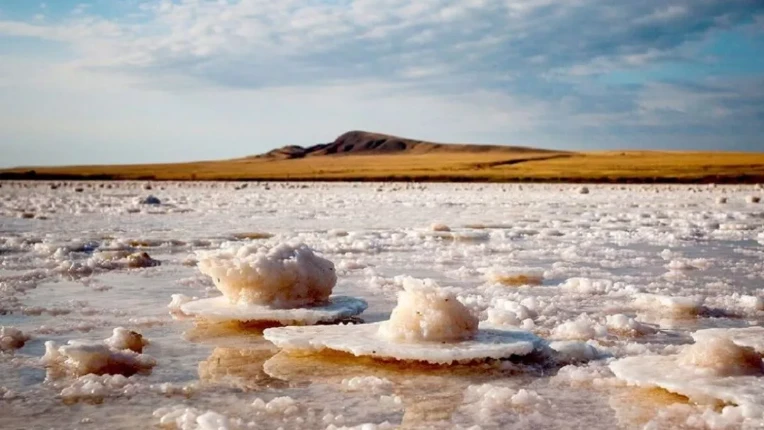
Lake Baskunchak and the sacred mountain Bogdo
Shamans, philosophers, and intellectuals journey here, sometimes from great distances, to perform ancient rituals. So do ordinary people, those who would like to return in their next incarnation as more “useful,” so to speak.
I climbed that mountain and looked down at the salt fields, and then out at the vast plain. I associate this place with the flat salt island of Kerkenna. Why couldn’t there be a powerful sacred place on Kerkenna too, even without a mountain to mark it? It’s easy to forget the memory of a place without a marker like a mountain, without someone to feel the blessing.
My assumption of a strong sacred place on Kerkenna is supported by the fact that ordinary tourists hardly ever visit the island. Tourists have a tendency to studiously avoid all sacred places, and empty places where thoughts can be avoided are preferred. And then there’s the deviant behavior of so-called law enforcers. These enforcers are very sensitive to the manifestation of intelligence and creative spirit, which is why they arrest writers, even future writers and scientists, in the opinion of many, without warrant. This has happened in all countries and at all times.
The expression of creative spirit, which involves finding a solution in an apparently hopeless situation, and not just any solution but one that maintains one’s honor, is seen as a personal affront by those who are called law enforcers.
When it became clear that both the Tunisian professor and I, the Russian writer, were both in jail, we hugged each other and exclaimed, “Bro!” By the way, if we recall the story of Heracles at the age of 15, we see that the so-called law enforcers forgot the importance of obeying the law and attempted to punish Heracles with the death penalty. However, their efforts were in vain as the people rose up to defend him. The Greeks of that time reminded the law enforcers that laws must be followed and that they should be fair, not solely for the benefit of the likes of Alexander the Great. We give credit to those Greeks and honor their memory for all time.
The professor has amassed a wealth of valuable information, which could be “cultivated” to a larger scale by a writer’s hand. However, the supposed strongest sacred place on the island is likely to surpass all of the professor’s information in terms of importance. When two former prisoners of a known category, and from different countries come together as “bros,” they can achieve more than they would separately. The language barrier remains the only obstacle.
By combining the aspirations of even more people, we can achieve even greater results. This includes those who are willing to help finance the work of the translator. Naturally, not everyone is suitable for this job, but we know the techniques we can use to distinguish the right translators from the rest. No translator will agree to participate without payment. If they find the terms of participation to be excessive, it is nothing more than an excuse.
There are also other expenses to consider. The Kerkenna Islands are 42 kilometers long, and at ages 66 and 68, we are not particularly spry. We will need funds for taxis – rides and waits. Additionally, the island of Kerkenna is not limited to the coastline. Fishermen, in clear weather and through the clear water, periodically see the outlines of buildings from who knows what civilization. In the Mediterranean, it is not uncommon for shores to sink under the water.
The professor speaks French and a Tunisian dialect of Arabic, while I speak Russian. Our everyday English won’t suffice. However, with an interpreter, we can produce videos in these languages. These videos won’t be lectures, but something more interesting and valuable: the search process. Such valuable content is not typically shown on TV. Moreover, we will require a cameraman, and sometimes two.
It is evident where the search will lead – among other places, to Heracles. Regularities are a mighty thing! If Heracles were among the defenders of Stalingrad, he would have found a way to get to the sacred mountain Bogdo. The same goes for the salt island.
We know that Heracles was in Tunis and passed through it from end to end on foot. But where did he linger? Considering his philosophical sophistication, he certainly did not take a straight path.
By the way, it is possible that Heracles was physically present on Bogdo. In the description of the Fourth feat of Heracles, it is said that when he pursued the doe robber (the Ceryneian Hind), she ran north for many months until she reached the border of Hyperborea. She then turned back when she encountered something frightening. But where is this border of Hyperborea? Maybe Mount Bogdo is situated on that border. Given the crucial events in Stalingrad, the city is already on the territory of Hyperborea. Baskunchak with Bogdo is located slightly to the south.
However, if no one in this world is interested in the search for two former prisoners of a known category, and from different countries, then the whole project will be postponed until a similar pair of former prisoners will reunite. This may take thousands of years, as one person in such a pair would have to be a local historian burning with an interest in this island.
I am also curious whether present-day Greeks would be interested in participating in this project. Moreover, while wandering around the Maghreb, I would like to be able to identify people and tribes. Therefore, those who would like to support this project, please inform me of your ancestral background in detail.
Tunisian professor: Abdelhamid Fehri cecerim2002@gmail.com, +216-97-899-560.
Russian writer: Aleksei Meniailov, romargashokov@gmail.com , vairgin.com.
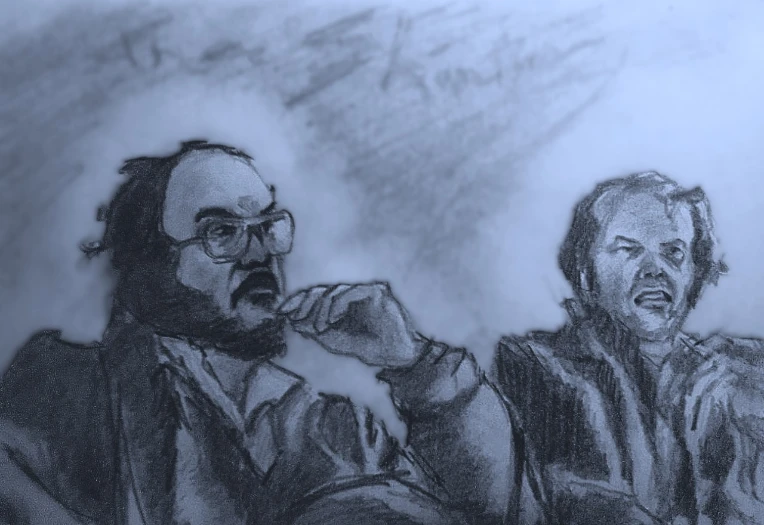
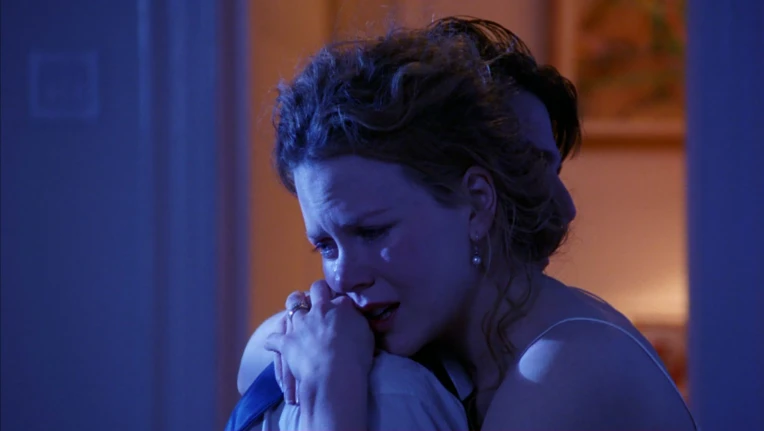 "Eyes wide shut", i was wondering if "The Shining" was so bad. Found it quite interesting.
"Eyes wide shut", i was wondering if "The Shining" was so bad. Found it quite interesting.


